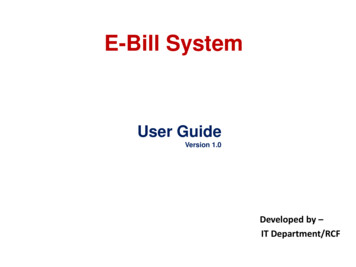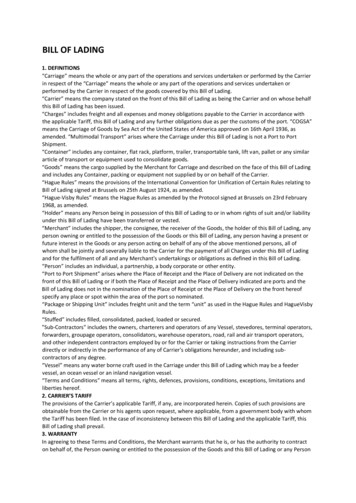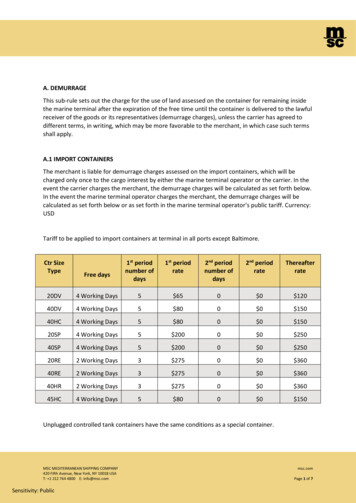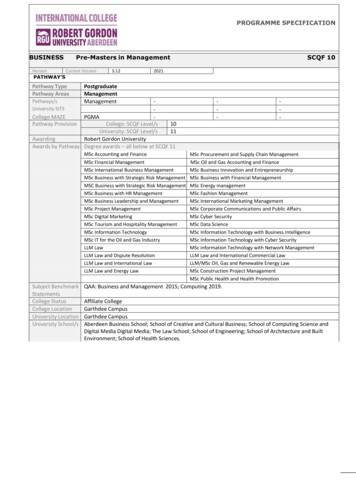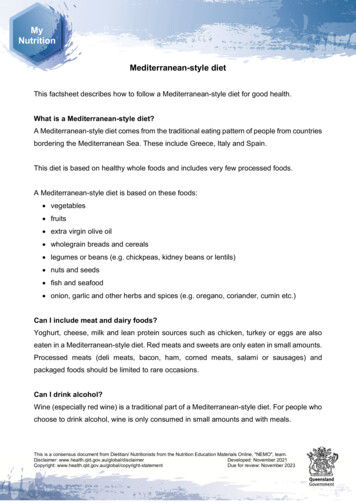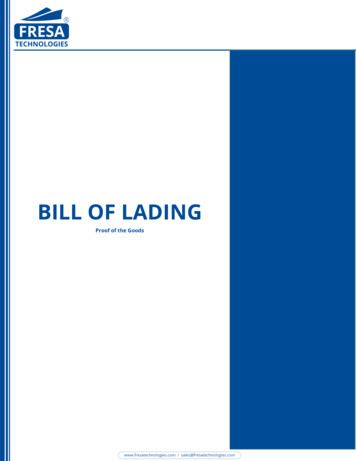
Transcription
MSC BILL OF LADINGFRONTRECEIVED by the Carrier in apparent good order and condition (unless otherwise stated herein) the total numberor quantity of Containers or other packages or units indicated in the box entitled Carrier’s Receipt for carriagesubject to all the terms and conditions hereof from the Place of Receipt or Port of Loading to the Port of Dischargeor Place of Delivery, whichever is applicable. IN ACCEPTING THIS BILL OF LADING THE MERCHANT EXPRESSLYACCEPTS AND AGREES TO ALL THE TERMS AND CONDITIONS, WHETHER PRINTED, STAMPED OR OTHERWISEINCORPORATED ON THIS SIDE AND ON THE REVERSE SIDE OF THIS BILL OF LADING AND THE TERMS ANDCONDITIONS OF THE CARRIER’S APPLICABLE TARIFF AS IF THEY WERE ALL SIGNED BY THE MERCHANT. If this is anegotiable (To Order / of) Bill of Lading, one original Bill of Lading, duly endorsed must be surrendered by theMerchant to the Carrier (together with outstanding Freight and charges) in exchange for the Goods or a DeliveryOrder. If this is a non-negotiable (straight) Bill of Lading, the Carrier shall deliver the Goods or issue a Delivery Order(after payment of outstanding Freight and charges) against the surrender of one original Bill of Lading or inaccordance with the national law at the Port of Discharge or Place of Delivery whichever is applicable. IN WITNESSWHEREOF the Carrier or their Agent has signed the number of Bills of Lading stated at the top, all of this tenor anddate, and wherever one original Bill of Lading has been surrendered all other Bills of Lading shall be void.[Signature]TERMS CONTINUED ON REVERSE MSC MEDITERRANEAN SHIPPING COMPANYSensitivity: PublicPage 1 of 12
REVERSETerms and conditions of MSC Mediterranean Shipping Company SA.Contract of Carriage continued from the reverse.1. DEFINITIONSThe following definitions shall apply in this Bill of Lading:Carrier: means MSC Mediterranean Shipping Company SACOGSA: means the U.S. Carriage of Goods by Sea Act, 1936.Combined Transport: arises if the Carrier has indicated a Place of Receipt and/or a Place of Delivery on the fronthereof in the relevant spaces. Combined Transport consists of a Port-to-Port carriage and Inland Transport.Container: includes any container, trailer, transportable tank, flat or pallet, or any similar article used to consolidateGoods and any connected or accessory equipment.Freight: includes the freight and all charges, costs, and expenses whatsoever payable to the Carrier in accordancewith the applicable Tariff and this Bill of Lading, including storage, per diem and demurrage.Goods: includes the whole or any part of the cargo carried under this Bill of Lading, including any packing orpackaging materials and Merchant owned or leased Containers.Hague Rules: means the provisions of the International Convention for the Unification of Certain Rules relating toBills of Lading signed at Brussels on 25 August 1924 with the express exclusion of Article 9.Hague–Visby Rules: means the provisions of The Hague Rules 1924 as Amended by the Protocol adopted at Brusselsston 23 February 1968, and 21 December 1979 (SDR Protocol) where applicable. Notwithstanding anything to thecontrary herein it is expressly agreed that nothing herein shall contractually apply the Hague-Visby Rules to this Billof Lading, and they shall apply only when compulsorily applicable by the law governing this Bill of Lading.Inland Transport: means carriage during Combined Transport other than between the Port of Loading and the Portof Discharge.Merchant: includes the Shipper, Consignee, holder of this Bill of Lading, the receiver of the Goods and any Personowning, entitled to or claiming the possession of the Goods or of this Bill of Lading or anyone acting on behalf ofthis Person.Person: includes an individual, corporation, company, or any other legal entity.Place of Delivery: means the place at which the Carrier has contracted to deliver the Goods, when such place isother than the Port of Discharge.Place of Receipt: means the place at which the Carrier has contracted to receive the Goods, when such place isother than the Port of Loading.Pomerene Act: means the United States Federal Bill of Lading Act, 1916 49 U.S.C. 801 or any amendments thereto.Port-to-Port carriage: means carriage between the Port of Loading and the Port of Discharge.Subcontractor: includes but is not limited to the owners, charterers, and operators of the Vessel(s) other than theCarrier, as well as stevedores, terminals and groupage operators, road and rail transport operators, warehousemenand any independent contractors employed by the Carrier performing the carriage, and any direct or indirectSubcontractors, servants, and agents thereof, whether in direct contractual privity or not.MSC MEDITERRANEAN SHIPPING COMPANYSensitivity: PublicPage 2 of 12
Vessel: includes the vessel named herein or any substituted vessel, feeder vessel, lighter or other watercraft utilizedby the Carrier for carriage by sea.2. ONTRACTING PARTIES AND WARRANTYThe contract evidenced by this Bill of Lading is between the Carrier and the Merchant. Every Person defined as“Merchant” is jointly and severally liable towards the Carrier for all the various undertakings, responsibilities, andliabilities of the Merchant under or in connection with this Bill of Lading and to pay the Freight due under it withoutdeduction or set-off. The Merchant warrants that in agreeing to the terms and conditions in this Bill of Lading, heis the owner of the Goods, or he does so with the authority of the owner of the Goods or of the Person entitled tothe possession of the Goods or of this Bill of Lading.3. CARRIER’S TARIFFThe terms and conditions of the Carrier’s applicable Tariff are incorporated into this Bill of Lading. Particularattention is drawn to terms and conditions concerning additional charges including demurrage, per diem, storageexpenses and legal fees, etc. A copy of the applicable Tariff can be obtained from the Carrier or its agent uponrequest and the Merchant is deemed to know and accept such Tariff. In the case of any conflict or inconsistencybetween this Bill of Lading and the applicable Tariff, it is agreed that this Bill of Lading shall prevail.4. SUBCONTRACTING AND INDEMNITY4.1 The Carrier shall be entitled to sub-contract on any terms whatsoever the whole or any part of the carriage,including liberty to further sub-contract.4.2 The Merchant undertakes that no claim or allegation whether arising in contract, bailment, tort or otherwiseshall be made against any servant, agent, or Subcontractor of the Carrier which imposes or attempts to imposeupon any of them or any Vessel owned or chartered by any of them any liability whatsoever in connection with theGoods or the carriage of the Goods whether or not arising out of negligence on the part of such Person. If any suchclaim or allegation should nevertheless be made, the Merchant agrees to indemnify the Carrier against allconsequences thereof. Without prejudice to the foregoing, every such servant, agent and Subcontractor shall havethe benefit of all terms and conditions of whatsoever nature contained herein or otherwise benefiting the Carrierunder this Bill of Lading, as if such terms and conditions were expressly for their benefit. In entering into thiscontract, the Carrier, to the extent of such terms and conditions, does so on its own behalf and also as agent andtrustee for such servants, agents, and Subcontractors.4.3 The provisions of clause 4.2, including but not limited to the undertaking of the Merchant contained therein,shall extend to all claims or allegations of whatsoever nature against other Persons chartering space on the Vessel.4.4 The Merchant further undertakes that no claim or allegation in respect of the Goods shall be made against theCarrier by any Person which imposes or attempts to impose upon the Carrier any liability whatsoever in connectionwith the Goods or the carriage of the Goods other than in accordance with the terms and conditions of this Bill ofLading, whether or not arising out of negligence or misdelivery on the part of the Carrier, and if any such claim orallegation should nevertheless be made, to indemnify the Carrier against all consequences thereof.5. CARRIER’S RESPONSIBILITY5.1 Port-to-Port carriage – If carriage under this Bill of Lading is Port-to-Port:(a) The period of responsibility of the Carrier for any loss of or damage to the Goods shall commence only at themoment that the Goods are loaded on board the Vessel and shall end when the Goods have been discharged fromthe Vessel.MSC MEDITERRANEAN SHIPPING COMPANYSensitivity: PublicPage 3 of 12
(b) This Bill of Lading shall be subject to the Hague Rules unless the governing law makes the Hague or the HagueVisby Rules compulsorily applicable in which case the said Hague or Hague-Visby Rules will apply to this Bill of Ladingonly to the extent that they are compulsorily applicable.(c) Notwithstanding the above, in case and to the extent that the governing law, or a contractual arrangement, orcustom and practice, or any court or tribunal decision extends the Carrier’s period of responsibility whether incontract, tort, bailment or otherwise to all or any part of the period before loading, or the period after discharge,including for misdelivery, then Carrier shall have the benefit of every right, defence, immunity, limitation and libertyprovided for in the Hague Rules during such additional period of responsibility, notwithstanding that the loss,damage or misdelivery did not occur during the carriage by sea.5.2 Combined Transport – The Carrier’s liability for Combined Transport shall be as follows:5.2.1 Where the loss or damage occurred during the Port-to-Port section of the carriage, the liability of the Carrieris in accordance with clause 5.1 above.5.2.2 Where the loss or damage occurred during Inland Transport, the liability of the Carrier shall be determined:(a) by the provisions contained in any international convention, national law or regulation applicable to the meansof transport utilized, if such convention, national law or regulation would have been compulsorily applicable in thecase where a separate contract had been made in respect to the particular stage of transport concerned, or(b) where no international convention, national law or regulation would have been compulsorily applicable, by thecontract of carriage issued by the Subcontractor carrier for that stage of transport, including any limitations andexceptions contained therein, which contract the Merchant and the Carrier adopt and incorporate by reference, itbeing agreed that the Carrier's rights and liabilities shall be the same as those of the Subcontractor carrier, but inno event whatsoever shall the Carrier’s liability exceed GBP 100 sterling legal tender per package, or(c) if any court shall determine that no international convention, national law or regulation would have beencompulsorily applicable and that the Carrier may not determine its liability, if any, by reference to the applicableSubcontractor’s contract of carriage or where said Subcontractor carrier does not have a contract of carriage, thenit is contractually agreed as between the Merchant and the Carrier that the Carrier’s liability shall be determinedas if the loss and/or damage complained of occurred during the Port-to-Port section of carriage as provided at 5.1above, but in no event whatsoever shall the Carrier’s liability exceed GBP 100 sterling legal tender per package.(d) If the place of loss or damage cannot be established by the Merchant, then the loss or damage shall be presumedto have occurred during the Port-to-Port section of carriage and the Carrier’s liability shall be determined asprovided at 5.1 above.5.2.3 Any transport that the Carrier arranges for the Merchant which is not part of the carriage under this Bill ofLading is done under the Merchant’s own responsibility, time, risk and expense and the Carrier acts as agent onlyfor the Merchant.5.3 Delivery to Customs or Port Authorities – Where any law or regulation applicable at the Port of Discharge orPlace of Delivery provides that delivery of the Goods to the Merchant shall or may be effected by the customs orport authorities at the Port of Discharge or Place of Delivery, notwithstanding anything to the contrary herein,delivery of the Goods by the Carrier to such customs or port authorities shall be deemed to be lawful delivery ofthe Goods by the Carrier to the Merchant and the Carrier shall not be liable for any loss of or damage to the Goodswhich occurs for any reason whatsoever after delivery of the Goods by the Carrier to the customs or portauthorities.6. U.S. TRADE CLAUSE6.1 Notwithstanding the provisions of clause 5, for carriage to or from any port of the United States, its territoriesor possessions, or if suit is brought in the United States, this Bill of Lading shall have effect subject to the provisionsof the COGSA and to the provisions of the Pomerene Act regardless of whether said Act would apply of its ownMSC MEDITERRANEAN SHIPPING COMPANYSensitivity: PublicPage 4 of 12
force. The provisions of the COGSA are incorporated herein and save as otherwise provided herein shall applythroughout the entire time the Goods are in the Carrier's custody, including before loading and after discharge aslong as the Goods remain in the custody of the Carrier or its Subcontractors, including cargo carried on deck.Nothing contained herein is to be deemed a surrender by the Carrier of its rights, immunities, exemptions orlimitations or an increase of any of its responsibilities or liabilities under the COGSA. Except for clause 5, every otherterm, condition, limitation, defence, and liberty whatsoever contained in this Bill of Lading shall apply to carriagein the US Trades.6.2 For limitation purposes under the GOGSA, it is agreed that the meaning of the word “package” shall be anypalletised and/or unitised assemblage of cartons which has been palletised and/or unitised for the convenience ofthe Merchant, regardless of whether said pallet or unit is disclosed on the front hereof.7. COMPENSATION AND LIABILITY PROVISIONS7.1 Subject always to the Carrier’s right to limit liability as provided for herein, if the Carrier is liable forcompensation in respect of loss of or damage to the Goods, such compensation shall be calculated by reference tothe invoice value of the Goods, plus Freight and insurance if paid. If there is no invoice value of the Goods or if anysuch invoice is not bona fide, such compensation shall be calculated by reference to the market value of such Goodsat the place and time they are delivered or should have been delivered to the Merchant. The market value of theGoods shall be fixed according to the current market price, by reference to the normal value of goods of the samekind and/or quality.7.2 Save as is provided in clause 7.3:7.2.1 (a) If and to the extent the Hague Rules or Hague-Visby Rules are compulsorily applicable to this Bill of Ladingby virtue of clauses 5.1, 5.2.1 or 5.2.2 (c) or (d) or otherwise, the Carrier’s liability for breaches or wrongs occurringduring such period of compulsory application shall in no event whatsoever exceed the amounts provided in theHague Rules or Hague-Visby Rules, whichever are compulsorily applicable.(b) If and to the extent the Hague Rules apply only contractually pursuant to clause 5, the Carrier’s maximum liabilityshall in no event whatsoever exceed GBP 100 sterling lawful currency per package or unit.7.2.2 Where COGSA applies by virtue of clause 6, neither the Carrier nor the Vessel shall in any event be or becomeliable in an amount exceeding US 500 per package or per customary freight unit.7.3 The Merchant agrees and acknowledges that the Carrier has no knowledge of the value of the Goods. Highercompensation than that provided for in this Bill of Lading may be claimed only when, with the written confirmationof the Carrier, the value of the Goods declared by the Shipper upon delivery to the Carrier has been stated by theCarrier in the box marked “Declared Value” on the front of this Bill of Lading and ad valorem charges paid. In thatcase, the amount of the Declared Value shall be substituted for the limits provided in this Bill of Lading. Any partialloss or damage shall be adjusted pro rata on the basis of such Declared Value.7.4 Nothing in this Bill of Lading shall operate to limit or deprive the Carrier of any statutory protection, defence,exemption, or limitation of liability authorised by any applicable laws, statutes, or regulations of any country orwhich would have been applicable in the absence of any of the terms set out in this Bill of Lading. The Carrier shallhave the benefit of the said laws, statutes, or regulations as if it were the owner of the Vessel.7.5 When any claim is paid by the Carrier to the Merchant, the Carrier shall be automatically subrogated to all rightsof the Merchant against any third party. The Merchant shall sign a subrogation receipt, release, and indemnityimmediately when requested by the Carrier.8. SCOPE OF VOYAGE, DELAY, CONSEQUENTIAL DAMAGESThe scope of voyage herein contracted for may or may not include usual or customary or advertised ports of callwhether named in this Bill of Lading contract or not and may include transport of the Goods to or from any facilitiesused by the Carrier as part of the carriage, including but not limited to off-dock storage. The Carrier does notMSC MEDITERRANEAN SHIPPING COMPANYSensitivity: PublicPage 5 of 12
promise or undertake to load, carry or discharge the Goods on or by any particular Vessel, date or time. Advertisedsailings and arrivals are only estimated times, and such schedules may be advanced, delayed or cancelled withoutnotice. In no event shall the Carrier be liable for consequential damages or for any delay in scheduled departuresor arrivals of any Vessel or other conveyances used to transport the Goods by sea or otherwise. If the Carrier shouldnevertheless be held legally liable for any such direct or indirect or consequential loss or damage caused by suchalleged delay, such liability shall in no event exceed the Freight paid for the carriage.9. METHODS AND ROUTES OF CARRIAGE9.1 The Carrier may at any time and without notice to the Merchant:(a) use any means of transport or storage whatsoever;(b) transfer the Goods from one conveyance to another including transhipping or carrying the Goods on a Vesselother than the Vessel named on the front hereof or by any other means of transport whatsoever, even thoughtranshipment or forwarding of the Goods by such means may not have been contemplated or provided for herein;(c) sail without pilots, proceed via any route (whether or not the nearest or most direct or customary or advertisedroute) at any speed and proceed to, return to and stay at any port or place whatsoever (including the Port of Loadingherein provided) once or more often, and in any order in or out of the route or in a contrary direction to or beyondthe Port of Discharge once or more often;(d) load and unload the Goods at any place or port (whether or not any such port is named on the front hereof asthe Port of Loading or Port of Discharge) and store the Goods at any such port or place, including but not limited tothe use of off-dock storage at any port;(e) comply with any orders or recommendations given by any government or authority or any Person or bodypurporting to act as or on behalf of such government or authority or having under the terms of the insurance onany conveyance employed by the Carrier the right to give orders or directions.9.2 The liberties set out in clause 9.1 may be invoked by the Carrier for any purpose whatsoever whether or notconnected with the carriage of the Goods, including but not limited to loading or unloading other goods, bunkeringor embarking or disembarking any Person(s), undergoing repairs and/or drydocking, towing or being towed,assisting other vessels, making trial trips and adjusting instruments. Anything done or not done in accordance withclause 9.1 or any delay arising therefrom shall be deemed to be within the contractual carriage and shall not be adeviation.10. NOTICE OF CLAIMS, TIME BAR AND JURISDICTION10.1 Notice - of loss or damage to Goods shall be given in writing to the Carrier or its agent at the Port of Dischargebefore or at the time of delivery. If the loss or damage is not apparent before or at the time of delivery, notice mustbe given within three (3) days of delivery to the Merchant or its agent. Claims shall be submitted in writingaddressed by the Merchant to the Carrier’s agent at the Port of Discharge.10.2 Time bar - In any event, the Carrier shall be discharged from all liability if suit is not commenced within one(1) year after delivery of the Goods or the date that the Goods should have been delivered for claims related to lossor damage during the Port-to-Port carriage, and for claims related to loss or damage during Inland Transport theshorter of nine (9) months or any time limit provided for by any applicable international convention, national law,regulation or contract by virtue of clauses 5.2.2 (a) or (b).10.3 Jurisdiction - It is hereby specifically agreed that any suit by the Merchant, and save as additionally providedbelow any suit by the Carrier, shall be filed exclusively in the High Court of London and English Law shall exclusivelyapply, unless the carriage contracted for hereunder was to or from the United States of America, in which case suitshall be filed exclusively in the United States District Court, for the Southern District of New York and U.S. law shallexclusively apply. The Merchant agrees that it shall not institute suit in any other court and agrees to be responsibleMSC MEDITERRANEAN SHIPPING COMPANYSensitivity: PublicPage 6 of 12
for the reasonable legal expenses and costs of the Carrier in removing a suit filed in another forum. The Merchantwaives any objection to the personal jurisdiction over the Merchant of the above agreed fora.In the case of any dispute relating to Freight or other sums due from the Merchant to the Carrier, the Carrier may,at its sole option, bring suit against the Merchant in the fora agreed above, or in the countries of the Port of Loading,Port of Discharge, Place of Delivery or in any jurisdiction where the Merchant has a place of business.11. MERCHANT-PACKED CONTAINERSIf a Container has not been packed by or on behalf of the Carrier:11.1 The Merchant shall inspect the Container for suitability for carriage of the Goods before packing it. TheMerchant’s use of the Container shall be prima facie evidence of its being sound and suitable for use.11.2 The Carrier shall not be liable for loss of or damage to the Goods caused by:(a) the manner in which the Goods have been packed, stowed, stuffed or secured in the Container, or(b) the unsuitability of the Goods for carriage in the Container supplied or for carriage by Container between thePorts or Places specified herein, or(c) the unsuitability or defective condition of the Container or the incorrect setting of any refrigeration controlsthereof, provided that, if the Container has been supplied by or on behalf of the Carrier, this unsuitability ordefective condition would have been apparent upon inspection by the Merchant at or prior to the time when theContainer was packed, or(d) packing refrigerated Goods that are not properly pre-cooled to the correct temperature for carriage or beforethe refrigerated Container has been properly pre-cooled to the correct carrying temperature.11.3 The Merchant is responsible for the packing and sealing of all Merchant-packed Containers and, if a Merchantpacked Container is delivered by the Carrier with an original seal as affixed by the Merchant or customs or securitycontrol intact, or the Carrier can establish bona fide circumstances in which the original seal was replaced, theCarrier shall not be liable for any shortage of Goods ascertained upon delivery.11.4 The Merchant shall indemnify the Carrier against any loss, damage, liability, or expense whatsoever andhowsoever arising caused by one or more of the matters referred to in clause 11.2, including but not limited todamage to Container, other cargo and the Vessel.12. REFRIGERATION, HEATING, INSULATION12.1 Special Containers with refrigeration, heating or insulation shall not be furnished unless contracted for on thefront of this Bill of Lading and extra Freight paid. If a carrying temperature is noted on the front of this Bill of Lading,the Merchant shall deliver the Goods to the Carrier at plus or minus 2 degrees Celsius from the noted temperature,and the Carrier shall exercise due diligence to maintain such supply air temperature, plus or minus 2 degrees Celsiuswhile the Goods are in its possession. IT IS THE MERCHANT’S OBLIGATION TO SET AND/OR CHECK THAT THETEMPERATURE CONTROLS ON THE CONTAINER ARE AT THE REQUIRED CARRYING TEMPERATURE AND TOPROPERLY SET THE VENTS. The Carrier does not undertake to deliver empty refrigerated Containers to the Merchantat any specific temperature. The Carrier has the right but not the obligation to refuse to accept any Container loadedby the Merchant for shipment where the Goods are not or were not loaded into the Container within plus or minus2 degrees Celsius of the contracted carrying temperature.12.2 The Merchant must take note that refrigerated Containers are not designed:(a) to cool or freeze Goods which have been loaded into a Container at a temperature higher than their designatedcarrying temperature. The Carrier shall not be responsible for the consequences of the Goods being loaded at ahigher temperature than that required for the carriage; norMSC MEDITERRANEAN SHIPPING COMPANYSensitivity: PublicPage 7 of 12
(b) to monitor and control humidity levels, even if a setting facility exists, and because humidity is influenced bymany external factors the Carrier does not guarantee and is not responsible for the maintenance of any intendedlevel of humidity inside any Container.12.3 The Carrier shall not be liable for any loss or damage to the Goods arising from latent defects, breakdown,defrosting, stoppage of the refrigerating or any other specialised machinery, plant, insulation and/or apparatus ofthe Container and any other facilities, provided that the Carrier exercised due diligence before releasing the emptyContainer to the Shipper.12.4 The Carrier does not warrant refrigeration or heating machinery but shall exercise care in its operation andmaintenance while in the actual possession of the Carrier. The Carrier will not accept responsibility for the recordingof temperatures in any form other than any reefer log book maintained on board the Vessel. The Carrier does notaccept to comply with any governmental program or protocol unless noted on the front hereof and additionalFreight is paid.13. INSPECTION OF GOODS AND SPECIAL CIRCUMSTANCESInspection - The Carrier shall be entitled, but shall be under no obligation, to open and/or scan any package orContainer at any time and to inspect, verify and weigh the contents without notice to the Merchant.Special circumstances - If it appears at any time that the Goods cannot safely or properly be carried or carriedfurther, either at all or without incurring any additional expense or taking any measures in relation to the Containeror the Goods, the Carrier may without notice to the Merchant (but as his agent only) take any measures and/orincur any reasonable additional expense to carry or to continue the carriage of the Goods, and/or to sell or disposeof them and/or to abandon the carriage and/or to store them ashore or afloat, under cover or in the open, at anyplace, whichever the Carrier in its absolute discretion considers most appropriate, and any sale, disposal,abandonment or storage shall be deemed to constitute due delivery under this Bill of Lading. The Merchant shallindemnify the Carrier against any additional expense so incurred. The Carrier in exercising the liberties containedin this clause shall not be under any obligation to take any particular measures and shall not be liable for any loss,delay or damage howsoever arising from any action or lack of action under this clause.14. DESCRIPTION OF GOODS AND MERCHANT’S RESPONSIBILITY14.1 This Bill of Lading shall be prima facie evidence of the receipt by the Carrier in apparent good order andcondition, except as otherwise noted, of the total number of Containers or other packages or units indicated in thebox entitled “Carriers Receipt” on the front hereof.14.2 No representation is made by the Carrier as to the weight, contents, measure, quantity, quality, description,condition, temperature, marks, numbers or value of the Goods and the Carrier shall be under no responsibilitywhatsoever in respect of such description or particulars.14.3 The Merchant warrants to the Carrier that the particulars relating to the Goods as set out on the front hereofhave been checked by or on behalf of the Merchant on receipt of this Bill of Lading and that such particulars, andany other particulars furnished by or on behalf of the Merchant, are adequate and correct. The Merchant warrantsthat the Goods are safely and securely packed in the Container.14.4. The Merchant also warrants that the Goods and/or Merchant-packed Containers are lawful Goods, containno contraband, drugs, other illegal substances, or stowaways, and that any hazardous or potentially dangerouscharacteristics of the Goods have been fully disclosed by or on behalf of the Merchant and that they will not causeloss, damage or expense to the Carrier, or to any other cargo, Containers, Vessel or Person during the carriage.14.5 If any particulars of any letter of credit and/or import license and/or sales contract and/or invoice or ordernumber and/or details of any contract to which the Carrier is not a party are shown on the front hereof, suchparticulars are shown at the sole risk of
MSC MEDITERRANEAN SHIPPING COMPANY Page 3 of 12 Sensitivity: Public Vessel: includes the vessel named herein or any substituted vessel, feeder vessel, lighter or other watercraft utilized by the Carrier for carriage by sea. 2. ONTRACTING PARTIES AND WARRANTY The contract evidenced by this Bill of Lading is between the Carrier and the Merchant.



